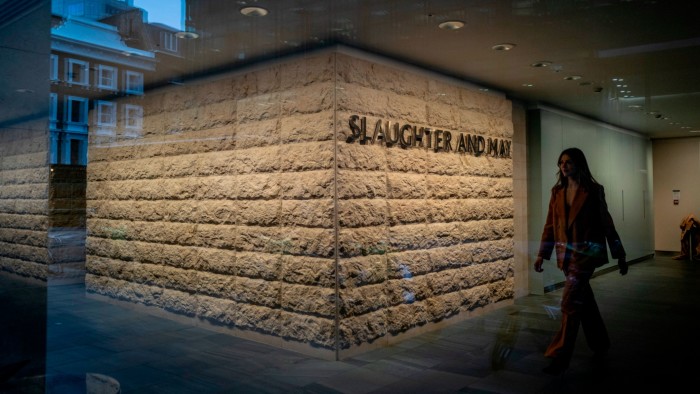Can Slaughter and May survive London’s US invasion?

Every autumn, partners at elite British law firm Slaughter and May are invited for the “paterfamilias” — a chat with the senior partner or “father of the family” — about their performance. The ritual is in keeping with the law firm, which has long projected an air of rarefied mystique.
This year, however, after decades of the format, the firm has renamed the yearly dialogue as an “annual discussion”.
While the change may seem like a footnote in the history of the 135-year-old institution, it is evidence that even Slaughters is being forced to adapt in the face of an onslaught of US law firm investment in London, which has sparked the biggest market disruption in recent history.
“Everything has its time,” said Roland Turnill, Slaughters’ senior partner, in his first interview since taking up the helm in May. To younger partners the Latin name “could appear anachronistic”.
London-headquartered law firms have been grappling in recent years with a growing tide of American firms expanding in the City, using their deep pockets to lure talent from English rivals. The trend, spurred in large part by private equity investment in Britain, has forced a number of UK firms to overhaul remuneration models and increase pay in a war for talent.
Even Slaughters, which has largely avoided the hiring frenzy, increased salaries 20 per cent for its most junior lawyers out of season this year. The decision came after a group of US firms upped pay in London, forcing the UK’s “magic circle” firms — the likes of Slaughters, Linklaters and Freshfields — to respond.

Slaughters has not suffered the same volume of partner defections to American rivals as peers such as Linklaters, which has seen 21 London partners depart for US firms over the past two years, according to data from legal recruitment consultancy Edwards Gibson. This is partly because Slaughters is not a big private equity player. But it also speaks to a different strategy, one the firm is now doubling down on.
Slaughters has been defined by its suite of blue-chip clients — names such as GSK, Diageo and Rolls-Royce — and high profitability, with a cachet that reaches beyond the legal sector.
Client mandates over the past year alone have included advising Vodafone on its proposed £16.5bn domestic merger with CK Hutchison’s Three UK, Google in relation to its various competition investigations across Europe, BHP in one of the largest-ever class actions in England and the Premier League in its arbitration proceedings against Manchester City.
One of the last true lockstep firms, in which partners move up the equity ladder that underpins take-home pay based on years of service, the fascination with Slaughters has in part been maintained by the firm’s decision to remain a general partnership rather than an LLP, which means it does not have to disclose revenues or partner pay.
Average profits per partner are estimated to be pushing £4mn. The firm’s total revenue was assessed to be £654mn and profits of £310mn for the last financial year, according to legal publication The Lawyer.
The firm also does not buy into the lateral hiring culture of other firms — Slaughters has only ever made two external partner hires in London. Instead, it has bet the house on homegrown talent and culture.
“A combination of cutting-edge work, high profitability and an almost mystically cohesive, homegrown partnership has made Slaughter and May’s partners almost impervious to headhunters,” said Scott Gibson, founder of Edwards Gibson.
That “mystically cohesive” culture has manifested in several traditions. Partners have their own pigeon holes containing bespoke napkin rings inside the partner dining room. They are encouraged to lunch together as often as possible and must always sit in the next available seat. Such etiquette may seem antiquated, but according to Slaughters lawyers, it also creates a collegiate atmosphere. Staff are even allowed to bring their dogs to work one day a month.
“I don’t think we make any effort to be mysterious,” said Turnill. “But we do feel a strong sense of belonging with each other and I think that projects itself to the outside world.”
One rare area that has attracted criticism in recent years is Slaughters’ failure to invest earlier in private equity as a practice area.

The decision not to invest “highlights how innately British the firm is. Acting mainly for UK plc companies was a strategic mistake,” said one partner at a US firm in London.
While Slaughters’ partners reject the idea that the firm missed the boat by not moving faster on private equity — because, according to one partner, “the boat’s huge” — the firm is now taking steps to grow the practice.
The firm made its first private equity partner promotion this year and is aiming to double practice revenues in the next five years, targeting upper mid-market work and, through that, some bigger players.
“I don’t think I would look back on private equity and say there’s some huge failure there. But I would say that it’s an obvious area of focus now,” said Turnill.
Unlike its rivals, which have grown large networks of global offices, Slaughters has also long eschewed international expansion in favour of a network of referral relationships, selecting the top firms in key jurisdictions.
The strategy gives Slaughters a lower cost base but relies on a heavy investment in its global relationships to ensure the work keeps flowing between their “best friends” — firms such as Italy’s BonelliErede and Spain’s Uría Menéndez.
“Recent London moves by the US firms have led the European one-stop-shop firms to try to match those moves stateside. But that’s a very tough market to conquer and get return on investment,” said Simon Nicholls, Slaughters co-head of corporate and M&A. “Our model has always been different and it still gives us strategic agility.”
Siobhán Lewington, a partner at legal recruiter Macrae, said: “Slaughter and May’s position remains unique in the London market. It’s much smaller than its peers . . . resulting in a reputation for a highly personalised service delivered by some serious heavyweights.”
Slaughters’ differences are also what attract young talent. The more boutique-style model — the firm has just over 100 partners — means individuals can have a bigger impact on decisions.
Known for having one of the shortest and most coveted partnership tracks of any law firm, from an intake of roughly 85 trainees only about seven will ever make it to partner, with some achieving the status in as little as 7.5 years.
The process is gruelling, according to people who have worked at the firm, with associates put on the “partnership process” — a rotation through different practice areas — often for a number of years. Multiple partners must endorse a candidate if they are to receive the ultimate prize, which also includes an instant pay rise from about £250,000 to more than £1.5mn.
“Those associates on track to partnership, they would become almost like robots. They would start talking the same and dressing the same,” said one person who had worked at the firm. “Anyone who comes up into the priesthood has been through the seminary.”
Still, in the face of growing competition in London and the need for greater flexibility and diversity, the firm has also tried to modernise. A senior counsel role was introduced as an option before partnership in 2016 and associates can also choose to reduce their working hours for reduced pay.
In many ways Slaughters’ future appears safer than its magic circle rivals who are battling frequent defections to US firms and making large investments to ensure their international footprints pay off. But with few levers to pull financially to match the soaring pay packets of American outfits — which have reached as much as $20mn for a select few — the firm must hold on to the secret sauce of its culture if its success is to endure.
“There’s a huge amount of noise about US firms investing in London, but I genuinely do believe competition is a good thing,” said Turnill. “We’re acutely aware of what goes on outside the window and of the market we’re in, and we are not remotely complacent.”
#Slaughter #survive #Londons #invasion






